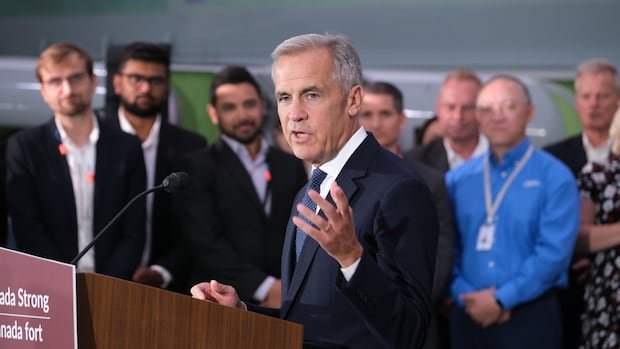Prime Minister Mark Carney unveiled a set of initiatives on Friday aimed at strengthening Canada’s economy to withstand the trade challenges posed by the Trump administration. The strategies outlined in the plan are tailored to assist workers and businesses most affected by President Donald Trump’s trade policies.
Addressing the audience in Mississauga, Ontario, Carney emphasized the need for immediate action amidst difficult circumstances. He expressed the government’s commitment to transitioning Canada from dependence to resilience and from uncertainty to prosperity.
A key aspect of the plan involves pausing the electric vehicle (EV) mandate, a requirement pushed by the auto industry. This pause will exempt the mandate for the 2026 model year and initiate a 60-day review of the policy. The EV mandate aims to achieve specific targets for zero-emission vehicle sales in Canada to align with emission-reduction goals.
Furthermore, the government introduced various measures, including a new “reskilling package” for up to 50,000 workers to facilitate training opportunities. Additionally, enhancements to the Employment Insurance program will provide extended support to laid-off workers, with adjustments to waiting periods and eligibility criteria.
To bolster businesses, a $5-billion strategic response fund will enable companies to innovate, develop new products, and explore new markets. The fund is open to all sectors, reflecting the wide-ranging impacts of tariffs across Canadian industries.
Carney also emphasized a “Buy Canadian” policy, directing government procurement to prioritize Canadian suppliers for long-term economic growth. This policy replaces the previous approach of merely making efforts to buy Canadian with a clear mandate to do so.
The government is also expanding financial support for businesses affected by tariffs. Small- and medium-sized enterprises will have access to larger loans, while the Large Enterprise Tariff Loan Facility will offer extended loan terms and lower interest rates to mitigate the impact of U.S. tariffs.
Additionally, specific assistance will be provided to the agricultural and seafood sectors, particularly the canola, beef, and seafood industries facing challenges from Chinese tariffs. Measures include a biofuel production incentive and regulatory changes to promote a thriving biofuels industry in Canada.
Conservative Leader Pierre Poilievre criticized Carney’s initiatives, calling them a mere facade. He accused Carney of failing to make substantial progress and negotiate effectively with the Trump administration, stating that Canadians are worse off now than before Carney took office.


